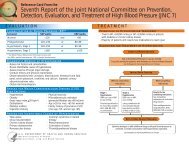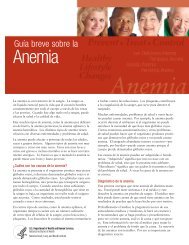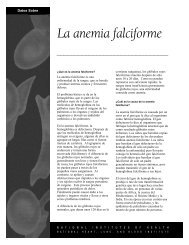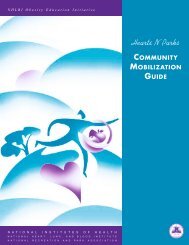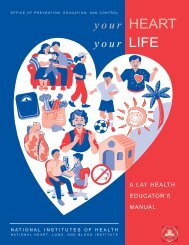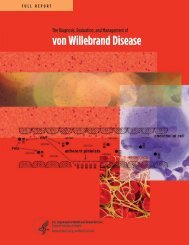WOMEN 'S HEALTH AND MENOPAUSE : - National Heart, Lung ...
WOMEN 'S HEALTH AND MENOPAUSE : - National Heart, Lung ...
WOMEN 'S HEALTH AND MENOPAUSE : - National Heart, Lung ...
Create successful ePaper yourself
Turn your PDF publications into a flip-book with our unique Google optimized e-Paper software.
Parkinson’s disease, no overall positive<br />
or negative impact of menopause or HRT<br />
on neurologic symptoms or disability has<br />
been described [C].<br />
Sleep disorders. Some sleep disturbances<br />
occurring during the climacteric may<br />
benefit from HRT [C].<br />
11.3 Mental Health<br />
Women of all ages have higher rates of depression<br />
than men, and geriatric depression is a particularly<br />
important public health concern. Hot flushes and<br />
other climacteric symptoms clearly affect the quality<br />
of a woman’s life. The menopausal transition<br />
does not appear to represent a time of heightened<br />
vulnerability to affective disorders.<br />
• Hormone replacement therapy<br />
Mood. Hormonal changes associated with<br />
menopause have little direct impact on<br />
mood [C]. Limited data from studies of<br />
women without clinical depression suggest<br />
a beneficial effect of estrogen on mood [B].<br />
11.4 Eye<br />
Increasing age is often accompanied by visual loss<br />
or blindness, and diminished visual acuity among<br />
older persons affects women more often than men.<br />
Some observational studies suggest the potential<br />
relevance of estrogen in eye disease.<br />
• Hormone replacement therapy<br />
Maculopathy, cataract, and dry eye. There<br />
is little evidence that HRT alters risk for<br />
certain types of age-related maculopathy,<br />
cataract, or dry eye [C].<br />
12. FUTURE NEEDS<br />
As life expectancy continues to increase, a<br />
challenge for the future will be to maintain and<br />
improve the quality of life in women as they age<br />
through better management of menopausal symptoms<br />
and health risks associated with menopause.<br />
Despite exciting new research in the field of<br />
menopause, including the availability of more<br />
choices for intervention and major breakthroughs<br />
in the understanding of ER-mediated effects, much<br />
work remains to be done. The increasing number<br />
of postmenopausal women and their increasing<br />
longevity highlight the importance of women’s<br />
health and well-being.<br />
Key needs for the field of menopause in the near<br />
future are outlined in table 1–3.<br />
Note:<br />
Limited data from<br />
The Women’s Health<br />
studies of women<br />
Initiative, NHLBI, NIH, is<br />
without clinical<br />
referred to throughout this<br />
International Position Paper. depression suggest<br />
As this document went to<br />
a beneficial effect of<br />
press, the NHLBI stopped an<br />
important component of the estrogen on mood.<br />
WHI on the basis of recommendations<br />
by the study’s Data and Safety<br />
Monitoring Board (DSMB), an independent advisory<br />
committee. The reasons for stopping this major<br />
clinical trial of estrogen plus progestin early were<br />
due to an increased risk of invasive breast cancer<br />
as well as increases in coronary heart disease,<br />
stroke, and pulmonary embolism in participants on<br />
estrogen plus progestin compared to women taking<br />
placebo pills. There were noteworthy benefits of<br />
estrogen plus progestin, including fewer cases of<br />
hip fractures and colon cancer, but on balance<br />
the harm was greater than the benefits. The study,<br />
which was scheduled to run until 2005, was<br />
stopped after an average follow-up of 5.2 years.<br />
However, because the balance of risks and benefits<br />
of estrogen alone is still uncertain, the DSMB<br />
recommended that that component of the WHI be<br />
continued unchanged.<br />
Because of the importance of the information<br />
from the estrogen plus progestin study, the results<br />
were released early in an expedited article on<br />
July 9, 2002 on the JAMA Website. Links to the<br />
JAMA article and a related editorial, can be found<br />
at http://www.nhlbi.nih.gov/whi/hrtupd/.<br />
19



